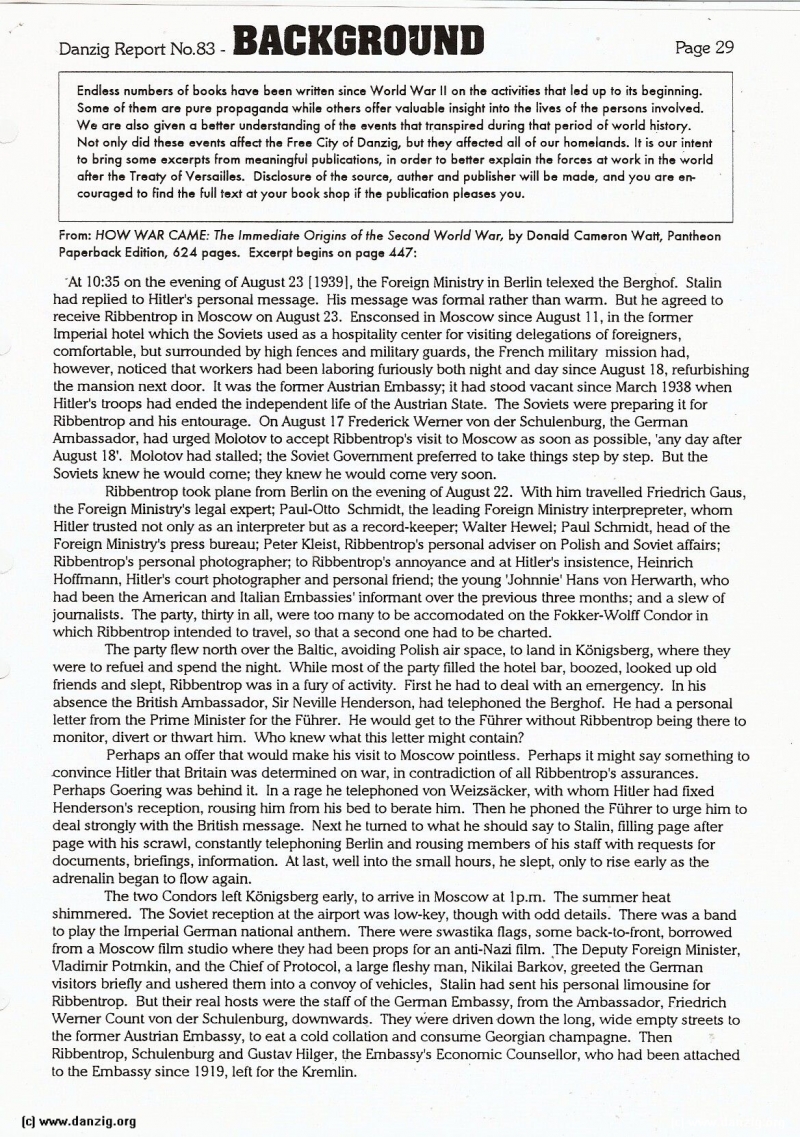
Endless numbers of books have been written since World War II on the activities that led up to its beginning. Some of them are pure propaganda while others offer valuable insight into the lives of the persons involved. We are also given a better understanding of the events that transpired during that period of world history. Not only did these events affect the Free City of Danzig, but they affected all of our homelands, It is our intent to bring some excerpts from meaningful publications, in order to better explain the Forces at work in the world after the Treaty of Versailles. Disclosure of the source, auther and publisher will be made, and you are enc ouraged to Find the Full text at your book shop if the publication pleases you.
From: HOW WAR CAME: The Immediate Origins of the Second World War, by Donald Cameron Watt, Pantheon Paperback Edition, 624 pages. Excerpt begins on page 447:
At 10:35 on the evening of August23 [1939!, the Foreign Ministry in Berlin telexed the Berghof. Stalin had replied to Hitler’s personal message. His message was formal rather than warm. But he agreed to receive Ribbentrop in Moscow on August 23. Ensconsed in Moscow since August 11, in the former Imperial hotel which the Soviets used as a hospitality center for visiting delegations of foreigners, comfortable, but surrounded by high fences and military guards, the French military mission had, however, noticed that workers had been laboring furiously both night and day since August 18, refurbishing the mansion next door. It was the former Austrian Embassy; it had stood vacant since March 1938 when Hitler’s troops had ended the independent life of the Austrian State. The Soviets were preparing it for Ribbentrop and his entourage. On August 17 Frederick Werner von der Schulenburg, the German Ambassador, had urged Molotov to accept Ribbentrop’s visit to Moscow as soon as possible, ‘any day after August 18’. Molotov had stalled; the Soviet Government preferred to take things step by step. But the Soviets knew he would come; they knew he would come very soon.
Ribbentrop took plane from Berlin on the evening of August 22. With him travelled Friedrich Gaus, the Foreign Ministry’s legal expert; Paul-Otto Schmidt, the leading Foreign Ministry interprepreter, whom Hitler trusted not only as an interpreter but as a record-keeper Walter Hewel; Paul Schmidt, head of the Foreign Ministry’s press bureau; Peter Kleist, Ribbentrop’s personal adviser on Polish and Soviet affairs; Ribbentrop’s personal photographer; to Ribbentrop’s annoyance and at Hitler’s insistence, Heinrich Hoffmann, Hitler’s court photographer and personal friend; the young ‘Johnnie’ Hans von Herwarth, who had been the American and Italian Embassies’ informant over the previous three months; and a slew of journalists. The party, thirty in all, were too many to be accomodated on the Fokker-Wolff Condor in which Ribbentrop intended to travel, so that a second one had to be charted.
The party flew north over the Baltic, avoiding Polish air space, to land in Konigsberg, where they were to refuel and spend the night. While most of the party filled the hotel bar, boozed, looked up old friends and slept, Ribbentrop was in a fury of activity. First he had to deal with an emergency. In his absence the British Ambassador, Sir Neville Henderson, had telephoned the Berghof. He had a personal letter from the Prime Minister for the Führer. He would get to the Führer without Ribbentrop being there to monitor, divert or thwart him. Who knew what this letter might contain?
Perhaps an offer that would make his visit to Moscow pointless. Perhaps it might say something to convince Hitler that Britain was determined on war, in contradiction of all Ribbentrop’s assurances. Perhaps Goering was behind ii In a rage he telephoned von Weizsäcker, with whom Hitler had fixed Henderson’s reception, rousing him from his bed to berate him. Then he phoned the Führer to urge him to deal strongly with the British message. Next he turned to what he should say to Stalin, filling page after page with his scrawl, constantly telephoning Berlin and rousing members of his staff with requests for documents, briefings, information. At last, well into the small hours, he slept, only to rise early as the adrenalin began to flow again.
The two Condors left Konigsberg early, to arrive in Moscow at 1p.m. The summer heat shimmered. The Soviet reception at the airport was low-key, though with odd details. There was a band to play the Imperial German national anthem. There were swastika flags, some back-to-front, borrowed from a Moscow film studio where they had been props for an anti-Nazi film. The Deputy Foreign Minister, Vladimir Potrnkin, and the Chief of Protocol, a large fleshy man, Nikilai Barkov, greeted the German visitors briefly and ushered them into a convoy of vehicles, Stalin had sent his personal limousine for Ribbentrop. But their real hosts were the staff of the German Embassy, from the Ambassador, Friedrich Werner Count von der Schulenburg, downwards. They were driven down the long, wide empty streets to the former Austrian Embassy, to eat a cold collation and consume Georgian champagne. Then Ribbentrop, Schulenburg and Gustav Huger, the Embassy’s Economic Counsellor, who had been attached to the Embassy since 1919, left for the Kremlin.
Danzig Report Vol. 1 - Nr. 83 - April - May - June - 1994, Page 31.
Hits: 3643
Added: 09/07/2015
Copyright: 2026 Danzig.org

